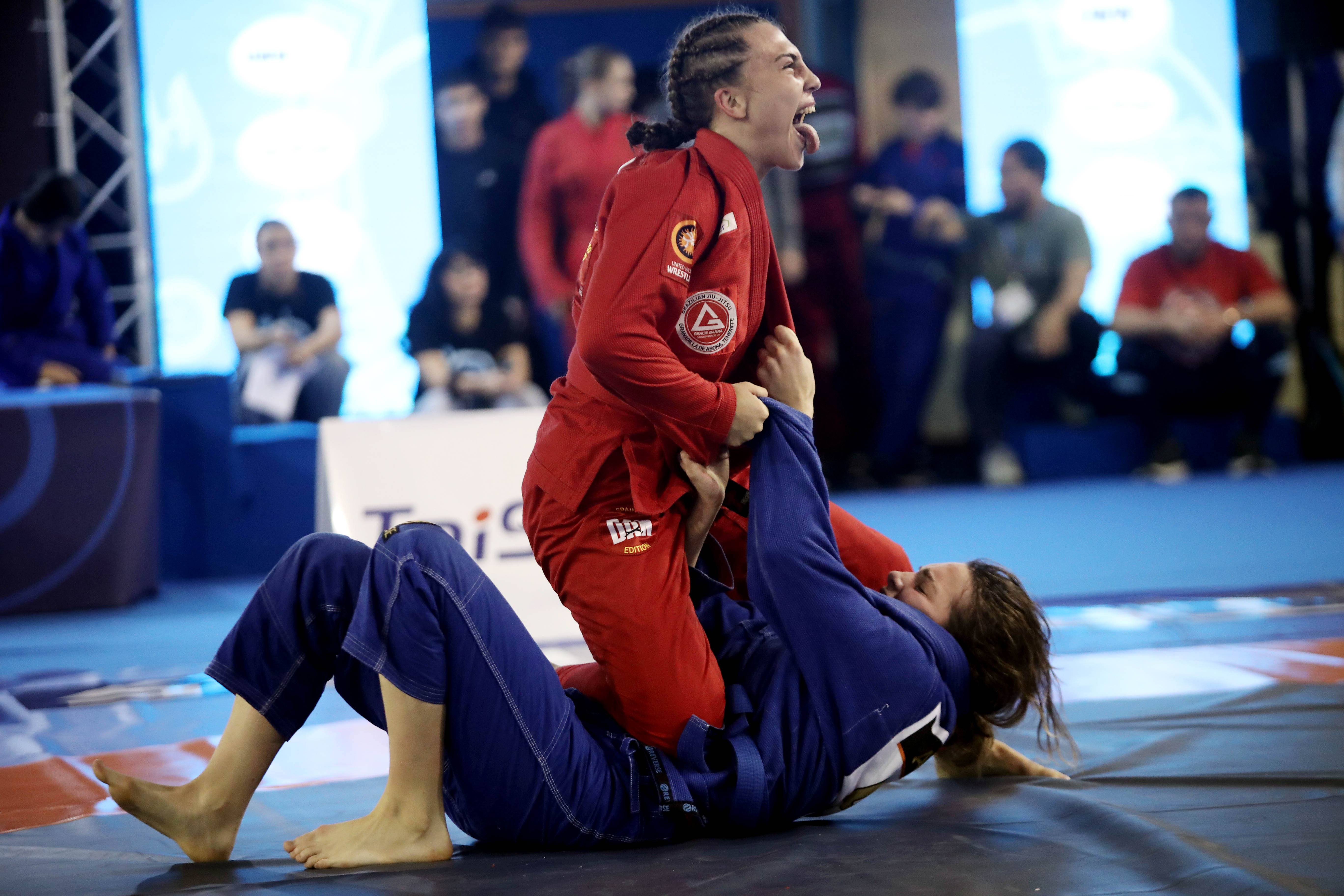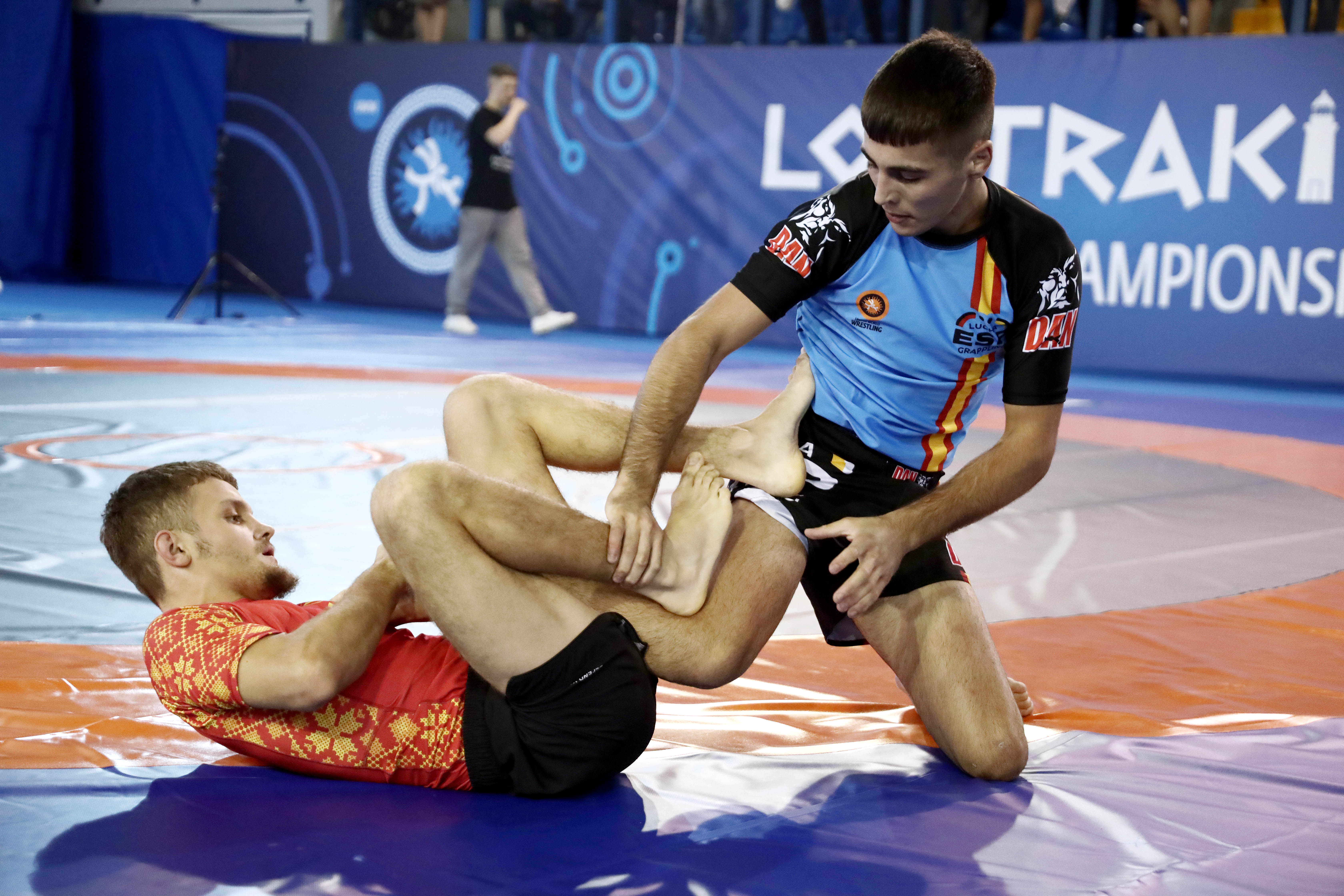Nanjo, Ozaki deny Kawai sisters tickets to Belgrade
Monday, July 17, 2023 - 11:14 By Ken Marantz

TOKYO (July 17) -- When sisters Risako and Yukako KAWAI won gold medals together at the Tokyo Olympics, they were the toast of the nation, appearing on countless TV shows and being treated as celebrities.
That was then and this is now, and two years after their triumph, neither sibling was able to make Japan's team to this year's World Championships, even after taking a shot at a non-Olympic weight class.
Risako, who now goes by her married name of KINJO, suffered a stunning last-second loss to Sae NANJO at 59kg, while Yukako was outdueled by Nonoka OZAKI at 65kg in playoffs for Japan's world team in non-Olympic divisions on Monday at Tokyo's National Training Center.
"Even if it's not [to qualify] for the Olympics, I wanted to go to the World Championships as sisters with Yukako," said Kinjo, the two-time Olympic champion and three-time world gold medalist. "It's very hard to take that I lost, but I felt I was better than at the Meiji Cup."
Both Nanjo and Ozaki went on to win their respective weight class in the ladder-style format to secure their tickets to Belgrade, along with Haruna OKUNO at 55kg and Miwa MORIKAWA at 72kg.
In Greco-Roman, Shohei YABIKU, a Tokyo Olympic bronze medalist at 77kg, claimed the spot at 82kg, while teenage Asian champion Arash YOSHIDA triumphed at freestyle at 92kg to earn his first trip to a World Championships on any level.
Under the criteria set by the Japan federation, any wrestler who finished in the top two in an Olympic weight class at the two domestic qualifiers for the World Championships -- the Emperor's Cup All-Japan Championships held last December and the Meiji Cup All-Japan Championships held in June -- but failed to make the world team in that division, either outright or in a playoff, could challenge for a spot at a non-Olympic weight.
The competition to qualify in the Olympic weights was fierce, as the federation proclaimed that any wrestler winning a medal in Belgrade will automatically fill the spot at the Paris Olympics that comes with it.
In Monday's playoffs, the winner of the Meiji Cup in each non-Olympic weight class was placed at the top of the ladder. But the real competition came in the earlier rungs, when those who failed to make an Olympic weight class clashed in pairings equivalent to a global championship.

Nanjo, who had lost out at 57kg to world champion Tsugumi SAKURAI, set up her clash with Kinjo by defeating Sara NATAMI by an 11-1 technical fall.
Kinjo, who had lost to Sakurai in the semifinals at the Meiji Cup to end her quest at 57kg, was eligible for the playoffs because she won the 59kg title at the Emperor's Cup, her first major competition after returning from childbirth.
Kinjo looked to be well on her way toward gaining a shot at a fourth world title when she stormed to a 6-0 lead over Nanjo, scoring a first-period takedown, then adding another early in the second period that she topped off with a lace-lock roll.
Nanjo knows something about losing last-second decisions -- Sakurai has done it to her three times, including at the Olympic weight class playoffs on July 1 -- so she was not yet ready to concede to her elder fellow Shigakkan University alum.
"When she turned me with the ankle hold and made it a six-point lead, I thought it might be over," Nanjo said.
Nanjo got on the scoreboard with a single-leg takedown, then levered Kinjo over for another two while very nearly ending the match with a fall. Kinjo manages to squirm out for a tenuous two-point lead.
In the final 10 seconds, Nanjo went for broke and secured a headlock, then desperately tried to twist Kinjo over at the edge. With just a couple of ticks on the clock remaining, she managed to expose Kinjo's back for a dramatic 6-6 victory.
Nanjo said she found strength in the woman in her corner, fellow Japan Olympic Academy product and former world champion Masako FURUICHI, who has always been there to encourage her when times are rough. "Whenever she is there, it gets me looking forward," Nanjo said.
Nanjo, a two-time world U23 champion who finished third in her lone appearance at a senior worlds in 2021, secured her ticket to Belgrade with a 10-0 technical fall over Sena NAGAMOTO in less than a minute.
"After I lost the 57kg playoff, it was tough to get back in the right frame of mind," said Nanjo, who graduated from Shigakkan in March and joined Toshin Construction company, which sponsors several elite wrestlers. "But I regained the desire to fight, more for all the people who support me than myself."
Kinjo knows that the path to a third Olympic gold is all but closed, and she says she will not be rooting for Sakurai to slip up in Belgrade and reopen it. But neither does she say we have seen the last of her.
"If I am asked if I will retire because this time I wasn't able to make it to the World Championships, I will say I'm not going out that easy," the 28-year-old said. "I've been given a job by my company because of wrestling, so we'll have to talk it over, but I won't be easily saying 'sayonara.'"

Earlier, younger sister Yukako's fate was decided by Ozaki, the world champion at 62kg who lost out to Sakura MOTOKI in that weight class.
Ozaki scored a takedown in each period for a 4-0 victory that left Kawai empty-handed in her attempts to make it to Belgrade in three different weight classes during the process.
Kawai had lost to Motoki in the 62kg semifinal at the Emperor's Cup, then came up short again when she moved up to 68kg at the Meiji Cup, losing to Morikawa in the final.
It was the second career meeting between the Ozaki and Kawai. Ozaki took the first clash, a 3-1 win in the 2022 Meiji Cup final at 62kg that clinched her place on the team to last year's worlds, where she won her first senior title.
Ozaki punched her ticket to Belgrade by overwhelming Meiji Cup champ Mahiro YOSHITAKE by fall in 51 seconds after building a 10-0 lead.
"I failed in the Olympic weight class, that was heartbreaking because that was what I was aiming for," Ozaki said. "To decide to go up a weight class to 65kg was a big deal. It was not easy to turn the switch back on. But it was important that I decided to do it."

At 55kg, two-time former world champion Okuno scored all of her points in the second period to chalk up a 7-2 victory over 2021 world U20 and U23 champion Moe KIYOOKA in the preliminary round. She then forged a 4-1 victory over Rina KATAOKA to secure the world team spot.
"Today, my goal was to decisively win out," Okuno said. "After the Meiji Cup was over, I tested some different things and I was able to use some of it on the mat. It really hit me that there's a big difference between practice and actual matches."
Okuno was the first of the five wrestlers in history who have completed the grand slam of all four age-group titles -- Yui SUSAKI made it a "golden" slam by adding an Olympic title. Furuichi is another, and Ozaki and Amit Elor (USA) joined the club last year. Okuno won world golds as a cadet in 2016, a junior in 2019, at U23 in 2017, 2019 and 2022, and on the senior level in 2017 and 2018.
Since that last appearance at the senior worlds in 2018, Okuno's path to global glory at 53kg was first shut off by Tokyo Olympic champion Mayu MUKAIDA, and in recent years by the phenomenal 2021 world champion Akari FUJINAMI.
Even at 55kg, Okuno has to be considered a title favorite this year in Belgrade, having suffered just two losses to non-Japanese opponents in her entire career. The first was a 6-4 loss in the third round at the 2014 world cadets to Alina Kazymova (RUS), and the second a 7-7 nail-biter to Yong-Mi PAK (PRK) in the semifinals at the 2018 Asian Games.

Morikawa, the world champion at 65kg who lost out to Ami ISHII in an attempt to make it to Belgrade at 68kg, had her hands full with the extra weight at 72kg but made it through with a 4-1 victory over Sumire NIIKURA and a 4-2 win over fellow Nippon Sports Science University alum Mei SHINDO.
"Yesterday we practiced together," Morikawa said of Shindo. "We have made each other stronger, but in a match, we both go out with the aim of beating the other."
Having moved up two weight classes, Morikawa said she feels the added weight of her opponents but looks forward to the challenge, particularly a possible meeting with defending champion Elor.
"I can't compare it with last year," Morikawa said. "The opponents, it may be rude to say, are monsters two weight classes up. I know that you can't take the World Championships lightly. But no matter the weight class, I want to show I can be the champion. As long as I'm entered, I'm there to win."

In Greco, Yabiku earned a trip to a fifth World Championships -- he has never placed higher than 13th -- by defeating Meiji Cup champion Yuya OKAJIMA by injury default.
Yabiku executed a throw from par terre that did not expose Okajima's back but was good for 2 points and a 3-1 lead. But Okajima landed awkwardly on his left foot and was unable to continue the match.
In freestyle, Yoshida scored a pair of stepouts and a takedown before holding on for a 5-3 victory at 92kg over Yudai TAKAHASHI.
Yoshida, whose father is Iranian and runs the kids wrestling club where he started the sport, had won the Meiji Cup title after capturing an impressive gold at the Asian Championships. He represents Japanese hope for future glory in the upper weights.
Among other weight classes, Kodai OGAWA denied high schooler and Meiji Cup champion Rin SAKAMOTO a trip to the senior worlds at freestyle 61kg by breaking open a close match in the second period and rolling to an 11-4 victory.
Japan's World Championships team
Freestyle
57kg: Rei HIGUCHI
61kg: Kodai OGAWA
65kg: Takuto OTOGURO
70kg: Yoshinosuke AOYAGI
74kg: Daichi TAKATANI
79kg: Yuto MIWA
86kg: Hayato ISHIGURO
92kg: Arash YOSHIDA
97kg: Takashi ISHIGURO
125kg: Daiki YAMAMOTO
Greco-Roman
55kg: Taiga ONISHI
60kg: Kenichiro FUMITA
63kg: Ryuto IKEDA
67kg: Kyotaro SOGABE
72kg: Shingo HARADA
77kg: Nao KUSAKA
82kg: Shohei YABIKU
87kg: Masato SUMI
97kg: Yuta NARA
130kg: Sota OKUMURA
Women
50kg: Yui SUSAKI
53kg: Akari FUJINAMI
55kg: Haruna OKUNO
57kg: Tsugumi SAKURAI
59kg: Sae NANJO
62kg: Sakura MOTOKI
65kg: Nonoka OZAKI
68kg: Ami ISHII
72kg: Miwa MORIKAWA
76kg: Yuka KAGAMI


 Angelica NIETO SANTOS (ESP) won the gold medal at 58kg. (Photo: United World Wrestling)
Angelica NIETO SANTOS (ESP) won the gold medal at 58kg. (Photo: United World Wrestling) Jose MARTIN SANCHEZ (ESP) became a double world champion. (Photo: United World Wrestling)
Jose MARTIN SANCHEZ (ESP) became a double world champion. (Photo: United World Wrestling)
Share your thoughts.
Comments